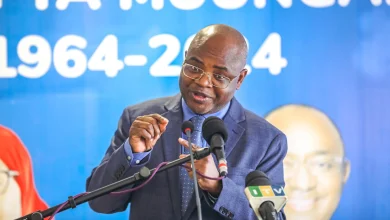AG drives tech innovation to protect investments

DODOMA: THE government has embarked on a digital overhaul of its contract management systems to safeguard trillions of shillings in public investments and ensure value for money in major development projects.
The initiative forms part of broader efforts to achieve the Vision 2050 goal of attracting 1 trillion US dollar in investments and building a sustainable national economy.
Deputy Attorney General, Mr Samwel Maneno said on Wednesday that his office is developing a modern digital system to monitor and evaluate all government contracts in real time, as part of efforts to strengthen transparency, coordination and legal compliance across public institutions.
Mr Maneno was speaking during a working session on legal and investment matters in the public sector.
He said the new system will help address recurring challenges in contract management and enhance collaboration among government entities.
“We have realised that we cannot effectively manage contracts without the help of technology. That is why our office has decided to develop a digital system that will enable real-time monitoring and evaluation of all contracts,” he explained.
The digital platform developed in collaboration with the National e-Government Agency (e-GA) is designed to track the full lifecycle of contracts, from procurement to implementation.
This will help to reduce delays, prevent disputes and mitigate financial risks.
“Some investment contracts span 20 to 40 years and often extend across different government administrations. Without modern tracking systems, it becomes challenging to monitor progress effectively,” said Maneno.
He explained that the government remains firmly committed to attracting and safeguarding investments, particularly in strategic sectors such as energy, infrastructure, industry and technology.
Mr Maneno said that robust legal frameworks and efficient contract management are vital for maintaining investor confidence.
“Public investments are a national heritage and a trust for future generations. These resources must be managed in accordance with the law to deliver maximum value to citizens,” he stressed.
According to Mr Maneno, the Attorney General’s Chambers reviews between 15,000 and 20,000 contracts each year, including major longterm agreements entered into by the government.
Contracts valued at over 1bn/- are automatically reviewed by the AG’s Office, while those below this threshold may be reviewed at the discretion of institutional heads or upon directive from the AG.
He added that new guidelines have been issued to enhance institutional understanding of contract management and ensure consistent compliance.
“We are urging heads of public institutions to submit their existing contract information so we can provide accurate legal advice where needed. It is also crucial that institutional leaders attend legal meetings personally rather than delegating to junior staff, to ensure informed and effective decision-making,” he said.
Mr Maneno insisted that modernising contract management is a key part of Tanzania’s broader strategy to build a strong and sustainable economy, aligned with the National Vision 2050 goal of attracting one trillion US dollars in investment.
“By strengthening institutional collaboration, modernising contract management and upholding the rule of law, we are laying a solid foundation for Tanzania’s development,” he said.
Meanwhile, Treasury Registrar, Mr Nehemiah Mchechu noted the growing value of public investments, saying that over 300 public institutions under his supervision have seen their combined assets increase from 86tri/- last year to 92tri/- this year. “The main Treasury Fund grew by 1.2tri/- last year and this year we expect contributions to exceed 1.7tri/-, moving steadily toward our target of 2tri/-,” he explained.
Mr Mchechu affirmed the government’s commitment to reforming and rebuilding public institutions through enhanced leadership, capital support and rigorous performance monitoring.
“We are strengthening the autonomy of high-performing institutions and setting clear key performance indicators, including financial performance, governance, customer satisfaction, staff welfare and transparency,” he said.
He further stressed the importance of ensuring citizens witness the tangible benefits of public investments in their daily lives.
“Our goal is to ensure Tanzanians understand and appreciate the impact their institutions have on their lives,” he said.
The working session brought together legal experts, public sector leaders and representatives from the Office of the Solicitor General and the Treasury Registrar, all united in aligning their efforts with the country’s long-term investment and development vision.





